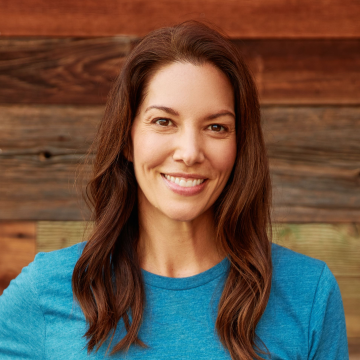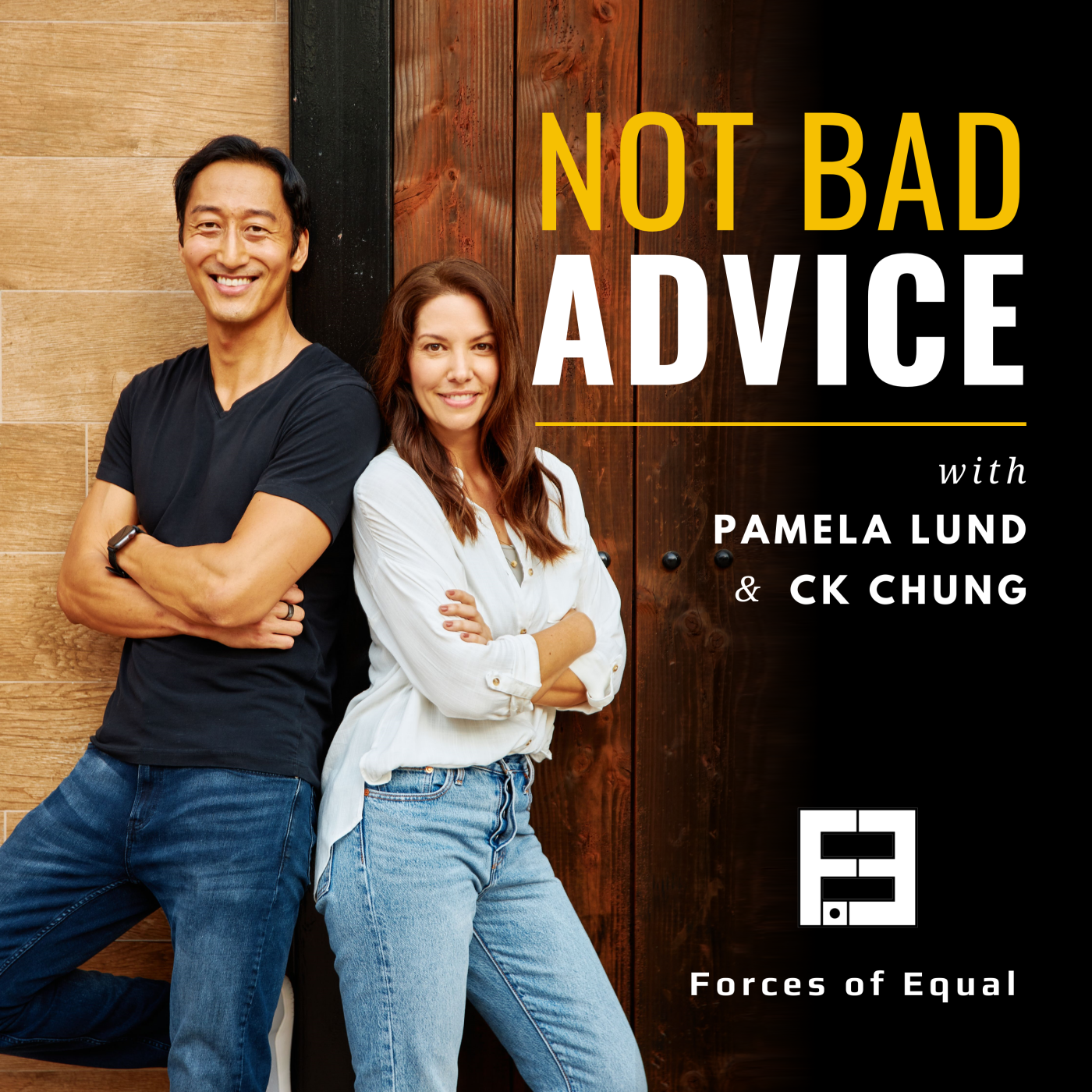Money represents more than buying power. Money is emotional. Knowing what money really means to you will uncover how you’re sabotaging your own financial goals and tell you what strategies to use to stay on track.
Ready to feel like you’re not bad with money? Visit NotBadWithMoney.com to learn about our financial coaching service that’s mostly practical and a little magical.
Got something you need advice about? Ask us here: ForcesOfEqual.com/Advice/
Transcript
Pam: [00:06] You’re listening to Not Bad Advice, where our goal is offer perspective that helps you improve one aspect of your life at a time.
[00:12] I’m Pamela Lund.
CK: [00:20] And I’m CK Chung.
Pam: [00:22] And we hope that after listening, you’ll think, “Hey, that’s not bad advice!”
[00:26] A quick programming note before we dive in today: We’re going to dedicate our next several episodes to money topics. We’ll go over everything from how to uncover the unconscious money stories that are sabotaging your goals to practical advice, like how to actually set up and use a budget that works for more than a month.
[00:54] As with all of our episodes, the advice you hear can be used on its own right away. But if you’re ready for more, we’re also announcing our newest coaching service: Not Bad With Money, a one-on-one personalized money and budget coaching program designed to heal your relationship with money, so you feel calmly in control of how it flows through your life.
[01:13] Visit NotBadWithMoney.com or click the link in the show notes if you’re ready to feel like you’re not bad with money .
[01:24] You get a lot of mixed messages about money starting in childhood, but reinforced everyday through media, personal relationships and society as a whole. In movies, we usually see two cliches, one of the evil, rich person versus the moral poor person or one of the poor person who is only saved from their doomed fate by becoming rich.
[01:44] We are simultaneously told that having wealth makes you greedy and immoral, but that if you’re poor, you should try to become wealthy. We’re also told that if we don’t save our money, we’re irresponsible, but then we’re bombarded with advertisements that convince us to buy things to fit in. We’re told to spend, but save.
[02:04] Or we grow up with parents who work long hours to earn money, making us unconsciously develop a negative association with earning money. Then when we’re adults, we strive to earn money ourselves without addressing the underlying psychological blocks that we developed when we were younger.
[02:21] These contradictions may seem minor, but when the messages are repeated over and over in our lives, we start to embody them and they affect how we behave.
[02:30] We end up with a lot of feelings about money – like shame, guilt, and fear, just to name a few – that make achieving financial goals difficult, if not impossible. Meanwhile, the only financial education we’re given is being told to save for retirement balance your checking account, and stick to a budget.
[02:49] But money is just not transactional, like we’re taught. It is deeply personal. And a key step in taking control of your financial future is uncovering how money makes you feel, why it makes you feel that way and how to feel the way you want instead.
[03:08] So more than likely if I asked how your financial situation makes you feel, you would say things like anxious, unsure, or even ashamed. And if you would, you’re not alone. Finances are consistently a top stressor in the American Psychological Association’s annual Stress in America survey. And other surveys have found that a majority of people regularly lose sleep over their finances. And 25% feel stressed about money most or all of the time.
[03:39] These trends cross economic lines as well. It’s easy to think that people with more money aren’t as stressed about it, but the data shows that having more money doesn’t mean you worry about it less.
[03:51] There are obvious advantages to having more income, and I want to be clear that in no way, am I trying to minimize the effects of economic hardship and poverty. We could talk for hours about all of the ways that income inequality is negatively impacting our society, how drastically we need to change how we value people, and how horrific it is that we live in such wealth while there are people who are literally unsure where their next meal will come from.
[04:19] And that’s all true, but at the same time, it’s true that there are people with six-figure and higher incomes that have financial anxiety. There are people that have a comfortable income, but just thinking about paying bills or what they’ll do if their car breaks down is anxiety inducing.
[04:37] So how do we stop feeling anxious and helpless regarding money when scarcity isn’t the issue? The first step is to figure out what money means to you. Money itself is just a concept. We hardly even touch physical money anymore. We just see a number on a screen and trust that it means something.
[04:57] So money itself isn’t what we care about. We care about what money means, and it means different things to different people based on myriad experiences and influences.
[05:09] But money will likely mean one of these four things to you. One, is safety and security. Two, is power and status. Three, would be freedom and independence. And the fourth is respect and love.
[05:23] And money will probably mean all four of these things in some ways. And at different points in your life, money may mean different things. So try to think of which one of those four categories is the most meaningful to you right now. How do you view money right now?
[05:40] CK, which of these four categories do you think is closest to what money means to you?
CK: [05:45] I’m thinking freedom and independence are the closest to what money means to me. And if I think about it, that’s the overarching principle in my entire life, not just about money.
Pam: [06:01] Sure. Do you think that what money means to you has changed as your life has changed?
CK: [06:05] Yeah, absolutely. In my younger days, I could see how it was more about power and status. And obviously money is closely tied to power in terms of how people think about money and power. And it’s. Probably easy to fall into that sort of mindset these days with all the thoughts and concepts around money.
[06:28] Sure. So for me, um, money actually means security and safety. It means that I won’t be homeless or hungry, and it means that I can provide for myself and my loved ones. freedom Independence are a strong secondary motivator for me. I definitely strive for freedom by accumulating enough money to never have to take a job that I don’t want, or to be in a situation where I’m dependent on someone I don’t want to be dependent on.
[06:55] Power and status are not important to me in the sense that we’re talking here. I don’t think I’ve ever associated respect with wealth. Like I don’t look at rich people and think that they automatically deserve my respect just for being rich. So, my need for security and my desire for freedom are what drive my financial decisions.
[07:13] And I know that now, but it took me a long time to learn it. Once I did though. I changed how I approached managing my budget, which led to changing my relationship with money.
[07:24] And that would be a whole 30 minute episode on its own. So I’m not going to go deep into how my money, anxiety manifested, but what’s important to note here is that simply taking the first step of identifying what money means to you can help you start being mindful of what your triggers are and how they affect how you interact with money and how you may be sabotaging your own goals.
[07:48] So there are a lot of ways our money motivations can impact how we behave, but I’ll give an example for each of the four meanings, so you can see if you identify with any of these.
[07:57] So if you’re motivated by security, like me, you might go through cycles where you severely restrict spending so you can save more, only to eventually binge spend because you’ve been denying yourself – just like a restrict binge-diet pattern with food. And once you identify that pattern, you can be mindful of it and know when you’re being too restrictive, and then you can develop a budget that meets your security needs without ignoring your other needs.
[08:28] If you are motivated by power and status, you might notice that you are triggered by friends buying new cars or houses that are bigger and nicer than yours, which makes you start shopping for something that will make you feel like you stack up. Once you’re aware of this pattern, you can review your financial goals and realign your focus on what you truly want rather than a shiny new thing.
[08:51] After all the most baller power and status money move is not buying a new car, but becoming financially independent.
[08:59] And If money means love and respect to you, you may find that you shower friends and family with gifts as a way to show affection. If the money you’re spending on those gifts is money that you should be saving or using for your own expenses, you think you’re showing love, but you’re actually harming yourself and your loved ones in the long-term, because they may end up financially responsible for you or just feeling guilty about all the gifts you gave them when you actually couldn’t afford them.
[09:29] So developing an awareness of why you buy the gifts, and what you’re trying to do by giving gifts can actually help you develop deeper relationships with your loved ones if you opt to spend time with them, rather than giving a gift.
[09:45] Finally, if freedom and independence are your money motivators, like CK, you may find that you always feel like you’re trapped. You feel trapped by your job, your commitments, your bills, and financial responsibilities. Everything that keeps you from being free will feel restrictive.
[10:04] So you may end up sabotaging your job prospects and, therefore, your income. Or completely ignoring bills and racking up late fees, both of which actually end up making you less free because you end up with less money.
[10:18] So noticing that pattern and putting together a financial plan that creates a feeling of freedom within the constraints of your current reality can help you achieve your longer term vision of freedom.
[10:31] So, if you don’t know what money means to you yet, you can start journaling or talking with a friend about any feeling that comes up that’s related to money, and see if you notice a trend that in indicates which of the four meaning themes you fit into.
[10:45] So, are you aware of any general trends of these tendencies? Like is the general public more susceptible to being motivated by power and status?
Pam: [10:57] It’s not, balanced in any way. It really is spread out across the spectrum. And especially because you can have a primary motivator and then, like, a secondary one. So with having these four, I think that it creates so many possible combinations of what your primary and secondary motivators are that there’s no, like, rule that 65% of people are motivated by security and safety, whereas only 25% are freedom and independence or something like that.
[11:23] I think that it’s fairly evenly spread and it really depends on what your experiences were, especially in childhood. That can really solidify what you’re money motivators are. And then how much, personal growth and development you go through in especially your late twenties and early thirties.
[11:42] I find that that really affects how people feel about money when they’re older and they actually start to maybe amass some money. You go through a huge change in what it means to you from your twenties when you’re kind of like maybe spending recklessly and not really caring about retirement.
[11:59] Maybe like you said, you do associate it more with power and status. Cause you’re like, you know, buying drinks at the bar or something like that.
[12:06] And then maybe you have kids. And so you start thinking that, Oh, maybe like it’s more safety and security.
CK: [12:12] Okay, that makes sense. Interesting.
Pam: [12:15] So yeah, with what point you are in your life or what your financial history has been, what your parents were like when you’re a kid, there’s so many things that can play into how you view money now. So you really have to think about it and start journaling or talking to a friend, like I said, and really find what the common feelings are that come up for you. And that will help you find what your primary and maybe secondary meaning for money are.
[12:44] And ultimately this practice is really about mindfulness and awareness of your deeper needs. But uncovering those needs takes time as does rewiring your responses to triggers, but you have to start somewhere to get anywhere.
[12:58] So start with observing what money means to you and how that meaning affects how you behave and the decisions you make. Then, you can decide if you want to keep those patterns or try building new ones.
[13:09] So it’s a good time to transition into the part of the show where I shuffle a deck of Oracle cards and pull a card to see how that card can relate to what we talked about today. And I like doing this because it gives me a visual to associate with the topic. And when I have a visual, it makes it easier to remember the perspective.
[13:52] So let’s see what the Nocturna Oracle deck from the creeping moon has to offer us as a visual for gaining perspective on how money makes us feel. So we’ve got the orchid today, which is perfect. The orchid was a symbol of luxury in a lot of countries because many orchid species are native to tropics and subtropics. So to have an orchid meant that you had the resources to have one brought to you or to travel yourself. Vanilla actually comes from an orchid, which I learned on a trip to Hawaii, where we went to a vanilla farm and got to see all of the orchids.
[14:41] And vanilla is a very luxurious scent and flavor. You know, we really associate that with luxury. So think about the orchid and think about where you’re spending money on luxuries that you don’t actually want or need to the detriment of achieving your financial goals. And think about what true luxury would be in your money story.
[15:02] What would actually feel the best to you? Focus on that feeling and be mindful of aligning your habits and behaviors with them. them . That’s not bad advice.
[15:19] If you identified with what we covered today and are feeling called to take charge of your finances, don’t forget to visit NotBadWithMoney.com to learn about our new money coaching service that combines practical and intuitive advice. Just like this show.
[15:33] And if you found yourself thinking, “Hey, that’s not bad advice,” while listening today, we’d love it if you shared the episode with your friends and rated the show in iTunes to help other people find us.
[15:43] You can get in touch with us on Twitter, where I’m @Pamela_Lund and CK is @cKdisco. If there’s something you need advice about, visit ForcesOfEqual.com/Advice where you’ll find a form that you can use to get in touch.






